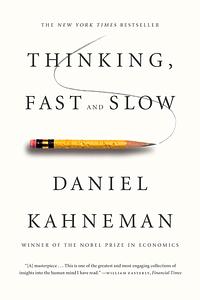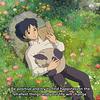You need to sign in or sign up before continuing.
Take a photo of a barcode or cover
informative
slow-paced
informative
inspiring
reflective
medium-paced
slow-paced
This is definitely a 4. A lot of 'rationality' and 'knowledge' in one book. This is something which I would want to come back and read some chapters, again and again (which I really want to do, but I doubt I will).
But, as a book, this sometimes becomes a drag. Feels a lot like an academic reading, which I guess it is. Some portions are really interesting, and you feel like "Yes!", "Yes!!", but after that, it gets boring. May be this could have been presented as a Infographic with the summarized lessons or may be this could have been shortened (Ha! there you go System 1). It has already been several months that I started with this, and I've finished several other books in between, I scanned through the latter half of it in faster pace.
Few hooks, and key concepts I recall: Basic difference between System 1 and System 2, anchoring, science of availability, loss aversion, sunk costs, framing, and of course the 'life as a story' with experiencing self and the memorizing self. Brilliant thoughts and implications to absorb and follow. I would suggest you watch his TED talk as well.
Then again, whenever I do not flow with a seemingly good book, I think, may be I'm not yet ready for this. May be.
"Nothing in life is as important as you think it is when you are thinking about it."
I thought this would be a good quote to quote in my review when I was reading this section, hence falling for a Focusing Illusion.
But, as a book, this sometimes becomes a drag. Feels a lot like an academic reading, which I guess it is. Some portions are really interesting, and you feel like "Yes!", "Yes!!", but after that, it gets boring. May be this could have been presented as a Infographic with the summarized lessons or may be this could have been shortened (Ha! there you go System 1). It has already been several months that I started with this, and I've finished several other books in between, I scanned through the latter half of it in faster pace.
Few hooks, and key concepts I recall: Basic difference between System 1 and System 2, anchoring, science of availability, loss aversion, sunk costs, framing, and of course the 'life as a story' with experiencing self and the memorizing self. Brilliant thoughts and implications to absorb and follow. I would suggest you watch his TED talk as well.
Then again, whenever I do not flow with a seemingly good book, I think, may be I'm not yet ready for this. May be.
"Nothing in life is as important as you think it is when you are thinking about it."
I thought this would be a good quote to quote in my review when I was reading this section, hence falling for a Focusing Illusion.
informative
slow-paced
Maybe 4.5? Fascinating book with fascinating information and details. It was jam-packed with learnings. I feel like I will need to read it again. The only reason I didn't give it a 5 is because I've been reserving 5s for when I walk away from a book feeling excited and inspired, like I know what I need to do next and this book helped me figure it out. That feeling was missing here, but maybe because it was more thought-provoking and caused me to slow down and reflect more?
A book that everyone should read to understand how and why we make decisions
inspiring
reflective
medium-paced
slow-paced
“ When you take the long view of many similar decisions, you can see that paying a premium to avoid a small risk of a large loss is costly“
For someone who knows nothing about the topic of heuristics and biases or about BE, this would be quite an eye opening read. Despite having studied most of the content of this book in my classes, I still found it interesting and informative.
I have to say that I totally disagree with the way he uses the word “ intuition” and all that is attached to it, but there are also many other concepts which I agree on.
In some parts I’ve found the book quite pessimistic ( e.g. “ most of us view the world as more benign than it really is” ) , but i can see how it is related to and representative of Kahneman’s personality. And that’s okay.
I agree with Thaler: this is a slow-read and maybe some chapters need to be read again from time to time.
Ps: take the base rate with you, wherever you go ;)
For someone who knows nothing about the topic of heuristics and biases or about BE, this would be quite an eye opening read. Despite having studied most of the content of this book in my classes, I still found it interesting and informative.
I have to say that I totally disagree with the way he uses the word “ intuition” and all that is attached to it, but there are also many other concepts which I agree on.
In some parts I’ve found the book quite pessimistic ( e.g. “ most of us view the world as more benign than it really is” ) , but i can see how it is related to and representative of Kahneman’s personality. And that’s okay.
I agree with Thaler: this is a slow-read and maybe some chapters need to be read again from time to time.
Ps: take the base rate with you, wherever you go ;)
Pps: the characters of the Penguin version are way too small
reflective
slow-paced



